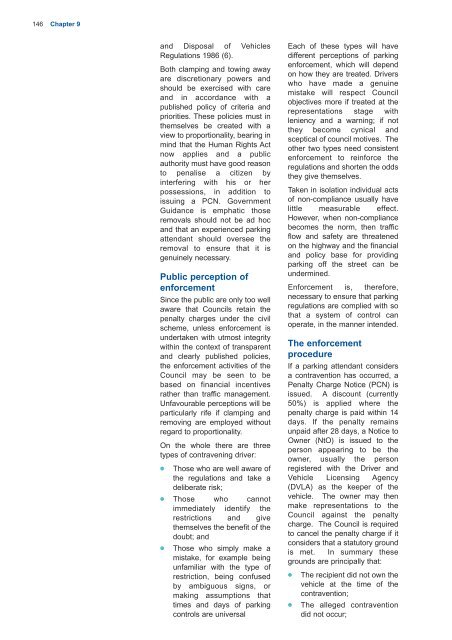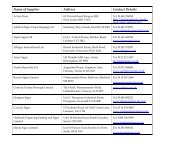titlepage/contents pg 1-16 - British Parking Association
titlepage/contents pg 1-16 - British Parking Association
titlepage/contents pg 1-16 - British Parking Association
You also want an ePaper? Increase the reach of your titles
YUMPU automatically turns print PDFs into web optimized ePapers that Google loves.
146 Chapter 9and Disposal of VehiclesRegulations 1986 (6).Both clamping and towing awayare discretionary powers andshould be exercised with careand in accordance with apublished policy of criteria andpriorities. These policies must inthemselves be created with aview to proportionality, bearing inmind that the Human Rights Actnow applies and a publicauthority must have good reasonto penalise a citizen byinterfering with his or herpossessions, in addition toissuing a PCN. GovernmentGuidance is emphatic thoseremovals should not be ad hocand that an experienced parkingattendant should oversee theremoval to ensure that it isgenuinely necessary.Public perception ofenforcementSince the public are only too wellaware that Councils retain thepenalty charges under the civilscheme, unless enforcement isundertaken with utmost integritywithin the context of transparentand clearly published policies,the enforcement activities of theCouncil may be seen to bebased on financial incentivesrather than traffic management.Unfavourable perceptions will beparticularly rife if clamping andremoving are employed withoutregard to proportionality.On the whole there are threetypes of contravening driver:● Those who are well aware ofthe regulations and take adeliberate risk;● Those who cannotimmediately identify therestrictions and givethemselves the benefit of thedoubt; and●Those who simply make amistake, for example beingunfamiliar with the type ofrestriction, being confusedby ambiguous signs, ormaking assumptions thattimes and days of parkingcontrols are universalEach of these types will havedifferent perceptions of parkingenforcement, which will dependon how they are treated. Driverswho have made a genuinemistake will respect Councilobjectives more if treated at therepresentations stage withleniency and a warning; if notthey become cynical andsceptical of council motives. Theother two types need consistentenforcement to reinforce theregulations and shorten the oddsthey give themselves.Taken in isolation individual actsof non-compliance usually havelittle measurable effect.However, when non-compliancebecomes the norm, then trafficflow and safety are threatenedon the highway and the financialand policy base for providingparking off the street can beundermined.Enforcement is, therefore,necessary to ensure that parkingregulations are complied with sothat a system of control canoperate, in the manner intended.The enforcementprocedureIf a parking attendant considersa contravention has occurred, aPenalty Charge Notice (PCN) isissued. A discount (currently50%) is applied where thepenalty charge is paid within 14days. If the penalty remainsunpaid after 28 days, a Notice toOwner (NtO) is issued to theperson appearing to be theowner, usually the personregistered with the Driver andVehicle Licensing Agency(DVLA) as the keeper of thevehicle. The owner may thenmake representations to theCouncil against the penaltycharge. The Council is requiredto cancel the penalty charge if itconsiders that a statutory groundis met. In summary thesegrounds are principally that:●●The recipient did not own thevehicle at the time of thecontravention;The alleged contraventiondid not occur;







